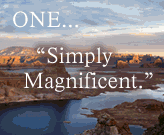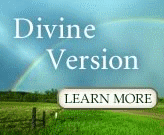Reflections
Can you add a single moment to your life
by worrying? Why become anxious
about clothes? If even the
smallest things are beyond your control,
why are you anxious about the rest?
Learn from the way the wild flowers
grow; they do not work or spin. I
tell you: not even Solomon, in all his
splendor, was clothed so well as one
little flower. --Jesus
ONE: 596-600
Is the
story of Veronica's Veil
Click here.
Interview with Gregg Zegarelli
Interview with Gregg R.
ZegarelliONE *
Why now, 2,000 years
later?
"If you asked Frank Lloyd Wright why
his buildings were not built 2,000 years ago, he would answer that the
technology at the time did not support the idea for the intended design.
Only recently did the new technology provide the tools to access the
material in the manner of the intended design."
Gregg R. Zegarelli
Interviewer Gregg Zegarelli
Good morning, Gregg. Thank you for taking the time to speak with
me. It's my
pleasure. Thank you for your time, as well.
Let's get right to it. Why did you write
? I thought it needed to be done, and I had the capability to do it,
and I was inspired to do it.
Tell me why you thought you had the capability of doing
it? Let me start with your education.
Saint Bartholomew Grade
School ,
Central Catholic High School ,
Duquesne University , and
Duquesne
University Law School .
Those are all Catholic institutions, right? Yes.
But to be quite frank about it, I never really thought about it that
way, although, in retrospect, I am very thankful it happened
that way. Actually, because many of my friends were going to
public schools, my father had to persuade me to go to
Central Catholic
High School, but that's a story for another day.
In what field is your degree? I have a
Juris Doctorate from the Duquesne University Law School.
My undergraduate degree is a Bachelor
of Arts from Duquesne University.
I had dual major areas of study in History and Accounting, and dual
minors in Philosophy and
Political Science. I also studied the classics and classical
languages.
What does being an attorney have to do with Jesus...what's the
connection? Everything.
The four Gospels of Jesus are called "testimonies" such as they are the
four recountings of Jesus' life by Matthew, Mark, Luke and John.
Attorneys are trained to deal in the reconciliation of testimony.
So, with
that said, back to capabilities...Why do you say that you thought you had the capability
to write ? Well, I suppose there are a few factors that I can
point to. From a technical perspective, I think
it's three things: computer skills, legal training and owning my
own law office. First, I could not have managed the
technical process of unifying the text without significant computer
skills. Really, documenting the unification process with 3,000
references, each of which can individually point to up to all four Gospels
was a daunting task. I actually banged my head on the table a
couple of times thinking it would never end.
Second, without significant legal
training and experience, I could not have managed unification of the
four testimonies from a conceptual perspective. Attorneys
are trained to find the single truthful story within multiple varying
testimonies. The individual testimonies remain, but only on single
truth can be put to the judge or jury.
Third, without owning my own law
office, I would not have been able to manage my time and financial
resources to accomplish the project. That is, writing the book was
a huge undertaking over 2 years. If I needed to take time to
complete the work, I could do so; because I am the employer, I could not
get fired--it just cost me time and money.
Okay, I will
come back to it, but that also sounds like the answer to why you believe
a book like this was never written before? Maybe.
You say, "I
thought it needed to be done." Why. That's the best
question. Why? There's a short answer and long answer.
The short answer is this: I am an
attorney. I am well-educated, and I have been practicing for 18
years. Now, there are different types of lawyers: for example, criminal
lawyers, personal injury lawyers, corporate lawyers. I would be
considered a cross between a corporate lawyer and a corporate litigator.
My
clients have hired me to review terms and conditions for some very
complex deals, including venture capital and mergers and acquisitions.
I am not trying to puff here, that's not the point, I'm trying to set a
premise that my profession requires a significant amount of detailed reading, writing,
analysis and reconciliation of textual works.
Having said that, I began deeply studying the bible in the year
2000 after I became married to my wife, Jodi. That's where the
long story comes in, which is also a story for another day. In
reading the Gospels, I thought it was just too hard. I thought,
"If it's too hard for me, and I am trained to read complex documents all
day, it must be too hard for others, as well." So, ...
Wait, wait,
please. Let me stop you, because I don't want to lose track of the
question. People have been reading the Gospels for 2,000 years.
Please explain what you mean, "too hard." Absolutely. I love
that question; that's the heart of it. Let me start with a fact.
There are four Gospels, right?
Right. And, each of the Gospels
concerns the story of Jesus, right?
Yes. But, none of the Gospels has
the entire story of Jesus, right?
Well, I
never really thought about it, but if you say so. Good. The fact
that you never thought about it is part of my point. But, I won't
press you on that right now, since you won't be happy with me if I start
asking you the questions. It
is true. None of the Gospels has the entire story of Jesus.
If you look at Unification Index, you will see clearly that each Gospel
is a separate "testimony" of Jesus' life. There are parts in one
that are not in the others. [Editor's note:
see
Sample Pages ,
Unification Index ]
For example, the Gospel of Luke has
many more parables than the other Gospels. Only, Matthew and Luke
contain the statement of Unending Forgiveness [forgive seventy-seven
times in one day]. Only John has the story of Jesus washing the
feet of the Apostles at the Last Supper. These are only a couple
of examples.
Okay... So,
is that why you believe that
is so appealing? Before
,
the reader had to do the following: read each of the four Gospels,
remember each of them, compare and contrast each version with the other
versions — to
the extent that the reader can remember the individual texts, then
integrate them in the reader's mind. After that, the reader must
try to understand the complete message. Ultimately, you learn the
Gospels in bits and pieces. It's just too hard,
and it should not be that hard. Even after writing ONE, I
still cannot do it from memory. I need to go to the Unification
Index to see exactly from where clauses are derived.
Thank you.
I understand now. But, are you saying that you've re-written the
Gospels? No, of course not.
is what it is. It can eliminate barriers of entry for
the study of Jesus, and, at the same time, provide a scholarly reference
for preachers. It is not intended to replace the Gospels, or the
direct study of the Gospel. I am so pleased that it has been
received as a work of goodness.
There is no way to deeply study the Gospels
without deeply studying the source Gospels. But, not everyone has
the time to read all four Gospels, and, in truth, they
should not have to do so. In retrospect, I have heard many people
say that the Gospels are intimidating to read.
I love the story of Michelangelo, in
which he said that the statue of David was already in the marble and
that he merely removed the excess marble in revelation. There is,
of course, no "excess" in the perfect Gospels considered by some to be
divine. But, that's a bit theoretical, and we live in a real world
where we must eat and sleep, and take the time to read the Word and to
reflect on the message.
Jesus said his yoke easy and burden
light. All I have done is to take the four Gospels, superimpose
them upon each other and remove the general duplication. Then, I
took the unique portions and integrated them. So, in 230 pages,
shorter than most novels, you receive the entire text. All text is
accounted for and is proved in the
Unification Index .
Can you give
an easy example of the unified text? I would love to do so.
Just so you know, we do have a sample online on the website at
http://www.ougpress.com/storefront/Web/Product_Materials/ONE/Samples/ONE_Divine_Sample.pdf . I will use the example at
ONE:1707 relating to the story of Unending Forgiveness. It is a
very well-known story.
First, that story is only contained in the Gospels of Matthew and Luke;
it is not contained in Mark and John. That is, if you only read
Mark and John, you will not read that story. Even so, it is stated
differently in Matthew and Luke. Now, I am quoting generally here,
and not verbatim, so you need to go to ONE or the online
sample to see
the verbatim text and how it is exactly handled.
Let's start with Matthew.
Basically, in Matthew,
Peter approaches and asks
him, “If someone sins against me, how often must I forgive him?
Seven times?” Jesus answers, "Not seven, but seventy-seven times. "
It is generally considered that Jesus means unending forgiveness.
Next, Luke. Now, in Luke, the
story is similar, but different in a very important way. First, in
Luke, there is no question from Peter. Jesus merely makes a
proclamation. Secondly, Jesus places a condition into the
sentence. In Luke, it is something like, "If
someone sins against you, and if he repents, forgive him. And if
he does it and repents seven times, then you should forgive him."
So that is a very good single example
of how the texts are similar, and yet importantly different. In
the real-world, how does a non-scholar remember those fine distinctions?
That is, to remember the subtlety of the differences and similarities?
Particularly when these two source Gospels are often separated by the
entire Gospel of Mark.
Here is how I handled the unification,
and I believe that it is handled accurately and with complete integrity.
In , it reads something like:
Peter approaches Jesus and asks, “If someone
sins against me, how often must I forgive him? Seven times?”
Jesus answers, “If someone sins against
you, and if he repents, forgive him. And if he does it and repents
seven times, then you should forgive
him not seven but seventy-seven times. ”
ee
Sample Pages ,
Unification Index ]
The
end result is ease, clarity and greater impact of the message. At
the same time, if the reader does not recall that particular distinction — and
we have not met one reader who did remember that distinction — the
reader can source it back to the Gospels through the Unification Index
to prove the text.
On what
version of the Gospel is
based? This is where the
technology plays into the task. There are some great resources
only now available, 2,000 years later. I'm not saying the task of
unification was impossible without the new technologies, I'm saying that
lack of technology creates the inertia, or barrier, to perform the task.
I used the foremost digital library system; I
purchased more than 350
digital resources.
Is that why
you say, "for the first time in history." Yes. It's a
frequent question: Why now? Hasn't anyone done this before?
Why you, why now? This is a bible, 2,000 years old. How can it be?
It's hard to believe.
So, it's the
technology that makes
unique? To some extent.
Understand that the task was daunting, even with the technology.
Some would consider me very trained from a technology and legal
perspective, and, even with all the digital tools, it took me over two
years. Writing a unified story of Jesus is one task, but it was
the process of authoritatively tracking the unification that required
the technology. There are
"harmony of the Gospels" and there are "parallels of the Gospels," the
former being soft consolidations of the four Gospels — such as Mel
Gibson's Passion of the Christ — and the latter usually taking the form
of the respective texts of the Gospels placed in columns next to each
other. Harmony of the Gospels are, in every case of which I am
aware, not authoritative to the source texts. Parallels are
inherently authoritative, but they are not easily readable. So,
is authoritative and easy to read. It also contains a new
post-unification reference numbering system. Without the advanced
technologies available to manage the integration of the Gospels, the
task would be virtually impossible.
If you asked Frank Lloyd Wright why
his buildings were not built 2,000 years ago, he would answer that the
technology at the time did not support the idea for the intended design.
Only recently did the new technology provide the tools to access the
material in the manner of the intended design. The design was to
unify authoritatively.
So, if I
understand, I've
seen CD's and DVD's with the story of Jesus before that have the life of
Jesus. These are also consolidations, but not necessarily
authoritative unifications, right? Right. First,
let me say that there are many pre-existing works of goodness, but none
like . I cannot and will not say that
is better than any other work. Because they're all good and they
all serve their respective purposes. There are general narratives
of Jesus' life, and there are also tables that indicate, for example,
where a certain parable in one gospel is located in another gospel.
But, is different because
it is a complete textual integration of the original texts.
Absolutely, every clause — every clause — in the original four Gospels is
accounted for in ONE, and this is proven in the Unification
Index.
So, then
it's the Unification Index that makes
unique. The Unification Index
gives its authority. It is that authority that makes
ONE unique. From a reader perspective, should I illustrate with a couple examples?
Yes, please
illustrate with examples. Okay. I did not
tell anyone I was working on the book until it the initial text was
completed. When I finally told one of my staff, Lisa, that I was
completing authoring a book on the consolidation of the Gospels, she
reacted positively but somewhat unexcitedly. On another day, when I was explaining
the book in more detail to Shawnna, one of my other staff, in the
presence of Lisa, both Lisa and Shawnna got really, really excited.
So, I asked Lisa why she was so excited--somewhat fanatically--this time
and not before. She said because, this time, I explained the
Unification Index and the 3,000 references back to the source Gospels.
She said that was the difference to her between my "narrative take" on
the Gospels, versus something authoritative that allows readers to
cross-check my work and resolve the text back to the source Gospels.
In a separate example, I was
explaining to one of the marketing representatives the example of
Unending Forgiveness, and that, by unification, you see clearly see how repentance
integrates with the concept of forgiveness. She responded, "Great,
everyone has their take on the bible." I responded, "No, this is
not 'my take'; it is actually in the verbatim language of the original
Gospels. Just go to the Unification Index." [Editor's Note:
ONE:1707]
So, again, it is the Unification Index
gives its authority, and it is that authority that makes
ONE unique.
I'm glad you
mentioned "authority"; what makes you an authority. Are you not
the son of a hair dresser. That's funny. Yes,
I am. I know you're kidding when you say that about my father, but
he is very successful in his own right, and he authored a book of
inspiration and goodness,
Diamond Capsules for Success and Wisdom , and I am very proud of him.
He has always been my first and best teacher. The book is
dedicated to him.
As to me, I am who I am and I've done what
that I've done. I hope my work is received in the manner intended:
to share the good news.
I am an attorney, and, as such, I am
professionally trained to reconcile and to present testimony. That
is what attorneys are trained to do for their clients. I have
merely reconciled the testimonies of Matthew, Mark, Luke and John.
It was as if four witnesses entered my office with a story to tell.
As the attorney for my client, I can present the four original testimonies to the
judge and jury, but I must unify and summarize in my closing
argument with only one truth. And, so it is with
.
Are you
religious? Well, that depends upon
how you define "religion."
Let me say this: if you define religion as subscribing to the
traditions, rites and ceremonies of a certain particular institution, I
would have to say that I might be but don't consider myself to be.
I really like the statement of Abraham Lincoln, where he says that the articles of belief in religious
institutions are too complicated and that he would join any church that
has love as its only requirement for membership.
I think Jesus' teachings are very
clear. He said, "Learn the meaning of the
scriptures, 'I desire mercy, not sacrifice.'" I understand his
point to be all about substance over form. So, I do not think that
institutional rites and ceremonies are necessary to apply Jesus'
teachings. And, if religion should divide us, it is the devil's game.
The devil's trick.
Do you go to
Mass? That's personal, and I
don't believe that it is necessarily relevant to the technical work I've done with the book, ONE. I will say only this,
it is important for me, personally, to take a formal weekly moment to
appreciate, deeply, the beauty in the world and in my life, and to pray
for others while acknowledging that God's will be done.
Whether that moment would occur at a Roman Catholic church, a Baptist church,
Jewish Synagogue, Hindu temple or Muslim Mosque, for example, is
incidental for me. I really do not have any ability whatsoever to
make fine distinctions on things regarding the nature of God. I
do, however, have the ability to accept as I can the command to do deeds
of goodness.
Is this why
there are two versions of ONE ? Maybe, probably, but I
cannot really say. It just is what I was inspired to do. It
just is. I was raised Roman Catholic. Do
I think there are some aspects of Roman Catholicism that are difficult
for me to reconcile on pure substance? I suppose, but it is what
it is. And, even so, it's all good.
Like what? Look, I am not a teacher
here. I had the capacity and training to author the book,
,
and was inspired to do it. That's all.
Yes, but, if
your belief is part of why you wrote two versions of the book, then you
should at least give some examples. That's fine, provided
you understand that these are not criticisms, just a couple of my
personal reconciliation issues. Do I personally believe that women
should be denied the opportunity to be priests if they want to be?
No, not really. Jesus was obviously a Jew, and the lack of women
in the church was culturally traditional as was washing the outside of
the cup, but I personally think the time of that idea is passed.
Jesus, himself, was certainly not a traditionalist. Can someone argue that Jesus was a man and, therefore, all priests must
be men? Sure, I suppose on one foundation of analysis. But,
on another foundation, look at ONE: 2123. Jesus alluded to, in the
afterlife, there is no gender. Who really has authority to argue
about genitalia in heaven? So, I personally take no offense
whatsoever to any religion that permits full participation by women in
the rites and ceremonies. I think the benefit of leading the
celebration of deepened reflection is something to be
equally shared between genders.
Do I personally think that priests
must forego the blessing of marriage? No, not really. For
those who voluntarily make the choice and devotion, it can be beautiful,
but I personally do not find it a necessary constraint of belief.
Did Jesus say to leave spouse and family behind to follow his teaching?
Yes. But, I personally understand that to mean that anyone who
diverts you from good works, anyone, must be rejected — even
if that is your spouse or parent. Jesus spoke metaphorically on
many, if not most, occasions. If God created the human race and
commands union only by marriage, then how do procreation and complete
discipleship become reconciled? Even in ONE: 1782, I do not
understand Jesus to require celibacy, but only to acknowledge it when it
undertaken by those who can do so without pain of choice. Shall
pure devotion make us extinct? So, I personally take no offense
whatsoever to any religion that permits full participation by married
persons in leadership of rites and ceremonies. I think that
benefit is something to be equally shared. I understand that
communal leadership will necessarily separate some from others, but it
does not, to me, need to be based upon such a beautiful thing as
marriage and family. I do not think it is necessary to deny our
fundamental humanity to reconcile our devotion to the Spirit.
But, saying I have difficulty
reconciling some issues is nothing unusual. Certainly, many people have some
difficulties reconciling some aspect of religious tradition, but that
does not mean that these beautiful beliefs of fundamental goodness
become bad. So, for example, even though I have difficulty
accepting that celibacy must be a constraint of communal leadership,
does not mean that it follows that any religion that requires celibacy
is bad.
I understand that there can be value in the
consistency of tradition, even if the idea represented, to me
personally, is somewhat outdated.
Can I
follow-up with... Let's just get back to
the book for now.
Okay.
Tell me about the two books. Isn't it somewhat ironic that a book
named "" has two versions? No. Two paths can
come to one destination.
What is that
destination? Harmonious co-existence
in love. To be neither predator nor prey.
What are the
differences in the two versions of
? There are two versions,
called the "Divine" and the "Universal." The Divine version is the
complete reconciliation of the four Gospels. Every citation in
each of the four Gospels is accounted for in the Divine version of
. That is, you can source every reference from the source
Gospels in
. The
Universal version is for those who desire to study the four Gospels, but
without the certain events that rest on fundamental Christian faith.
For example, does a Jew or Muslim really want to read about Jesus rising from the
dead? It is somewhat fundamentally contradicting.
So, is the
Divine version for Christians and the Universal version for
non-Christians? No, not really.
Although, as a general rule, I would say that Christians should read the
Divine version first, and non-Christians might want to read the
Universal version first.
However, open-minded Christians can read the Universal version, because
it is still an accurate statement within its own context. And,
certainly, a non-Christian who desires to gain the full message of the
Gospels should read the Divine version.
How did you
come to name the two versions? As to the book itself,
it represents the unification of the four Gospels, and the two versions
represent the attempt to unify by finding common ground for a moral
teaching; thus,
. Because the Divine
version contains the entire unified Gospels, it has the immaculate
conception of the Virgin Mary, Jesus walking on water, changing water
into wine and rising from the dead. As the traditional definition
of Christians is to believe Jesus to be specially divine, the "divine"
version was so-named. The Universal version was named
because it is intended to be enjoyed by those who either do not believe
Jesus was divine or who wish a more empirical study of the Gospels.
That is, somewhat more universally acceptable. But, depending upon
how the term "Christian" is defined, there are some who call themselves
"Christians" who remain somewhat agnostic--meaning that they don't
know--as to certain miracles and they might find more comfort in reading
the Universal version, as well.
Fine. Will not
devout Christians be concerned--to say the least--about the Universal
version and the removal of certain miracles? I will answer this in
two ways. First, I am an attorney. I live in a real world of
judgment, and I understand the judgment that naturally occurs, whether
that judgment itself would be right or wrong. For this reason, I purposely kept the
covers of the two books virtually identical, so that the reader would
not disclose the particular version being read. We put small
stickers on the covers to distinguish the versions that can be removed.
I don't think anyone should be superficially judged
by the cover of the book they
read. I believe both versions to be works of goodness, but with
different purposes. So, it was purposeful, that
if you are reading ONE , no one knows which version you are
reading.
Secondly, let me be a bit more
theoretical and hopeful. I am hopeful that all Christians equally
embrace both versions for what they contain, in substance: the beautiful
consolidated teachings of someone generally believed to be one of the greatest
persons who ever lived. If the reader chooses to read either
version, that person is spending their valuable time learning the good
teachings of Jesus, and that, I hope, is something for us all to
embrace.
Okay, which
is your family reading? I recommend either and
both. As to which one they have or will read, you need to ask
them.
Where and
when can I get ? The Divine version is currently
shipping on a first-come, first serve pre-order basis. The
Universal version will be online approximately mid-December and will
physically ship late in the month. Because of
production timing, the books are available only on
www.MyOneBible.com . We do
not anticipate them to be in bookstores until 2007.
* Editor's Note: See
Gregg Zegarelli Blog for additional commentary by Gregg
Zegarelli. * This
interview is a compilation of various interviews and discussions
and has been set forth for the purposes herein. Copyright
2006
©
OUG Press. All rights reserved.
Permission is freely granted to quote Mr. Zegarelli's responses
herein without attribution to this content.








